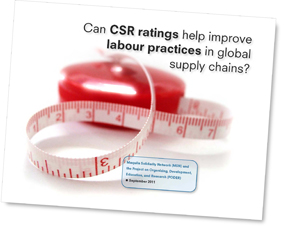WELCOME TO THE ARCHIVE (1994-2014) OF THE MAQUILA SOLIDARITY NETWORK. For current information on our ongoing work on the living wage, women's labour rights, freedom of association, corporate accountability and Bangladesh fire and safety, please visit our new website, launched in October, 2015: www.maquilasolidarity.org
August 17, 2011
The spread of Corporate Social Responsibility (CSR) rating systems in recent years shows an increasing interest by companies, ethical investors, civil society and consumers in identifying ways to measure a company's environmental and social performance in order to reward those companies that are making genuine improvements, and avoid those that are not.
Critics of CSR ratings, such as Scott Nova, Executive Director of the Worker Rights Consortium (WRC), argue that they give audiences a false sense of security regarding actual company progress on CSR in industries in which none of the companies is in compliance with minimum labour standards.
Others, such as Tim Connor, former Labour Rights Advocacy Coordinator of Oxfam Australia believe ratings can play a positive role, "More effective government regulation is critical, but voluntary efforts like ratings systems can still play some role in ratcheting up compliance with labour standards," says Connor.
Can CSR ratings help improve labour practices in global supply chains?, a new paper published by the Maquila Solidarity Network (MSN) and the Project on Organizing, Development, Education and Research (PODER), examines the potential of rating systems to drive improvements in supply chain labour practices. Through interviews with CSR experts, representatives from companies like Levi's, Gap and others that have been rated on supply chain labour issues, labour rights advocacy groups, and rating system developers, the paper highlights some key challenges facing rating systems and how some rating systems have tried to overcome, or at least minimize, those challenges.
The challenge of ratings in global supply chains
Although all rating systems struggle with finding appropriate indicators, weighting their results, making their process reliable and credible, and getting their message to the right people at the right time, ratings of labour practices have the additional challenge of capturing workplace realities in complex, global industries. While consumers and investors may assume that CSR rating systems measure actual corporate practice, including labour practices at the factory level, for the most part existing systems have limited access to reliable, timely and comprehensive data about labour practices in global supply chains.
"We are still a long way from getting systematized on-the-ground factory data," says Conrad MacKerron of As You Sow, which released its first ratings of apparel company supply chain labour practices in November 2010.
As MacKerron points out, even if reliable data on working conditions in some factories were available, the sheer volume of factories being used worldwide, and the continually shifting nature of supply chains, makes it nearly impossible to rate companies based on factory conditions. Disney alone, for example, says it has 24,000 active facilities making its products.
Given the difficulty of obtaining up-to-date on-the-ground factory data, most systems rate secondary data, such as whether a company has appropriate management systems in place that, presumably, will have a positive effect on conditions and practices at the workplace level. But there is scepticism in the labour rights community about whether good management systems actually translate to good factory conditions, so more and more ratings systems are looking at different ways to better measure factory realities.
The Good Guide, for example, gives companies "positive credit for engaging with a supplier to respond to violations found by WRC (rather than abandoning a problematic factory), for obtaining remediation for workers affected by violations, and for supporting the development of independent dispute resolution mechanisms or recognizing worker association and collective bargaining rights." Other rating systems have developed metrics to quantify media reports, either positive or negative, that capture problems at the factory level.
As the interest in rating systems continues to grow, along with the number of systems, more improvements need to be made in incorporating factory realities into final scores if these systems are to have any credibility.
Following the publication of Can CSR ratings help improve labour practices in global supply chains?, MSN and PODER conducted a brief survey on whether CSR ratings can improve labour practices in global supply chains. The survey yielded 159 responses from trade unionists, international brands, social investment professionals, NGOs, academics, monitoring organizations, and others. It also produced some interesting results and comments, which in addition to the publication provide some useful feedback on the practice of rating and ranking companies on social issues.